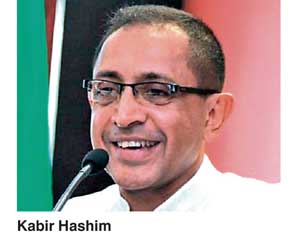Monday Feb 23, 2026
Monday Feb 23, 2026
Wednesday, 22 June 2016 01:20 - - {{hitsCtrl.values.hits}}
By Uditha Jayasinghe
Capital Gains tax could be rolled out as early as end July since the Government is looking to fast-track its revenue sources, a top minister said yesterday.
Public Enterprise Development Minister Kabir Hashim insisted the Government would formulate a structure for Capital Gains tax “in about a month” as it looks to speed up the process, which is part of broad tax reforms needed to boost public revenue. Tax reforms is also a crucial part of the International Monetary Fund program with Sri Lanka.
“Capital Gains tax can be introduced in about a month and it will likely be imposed on land and all other assets,” the Minister said in response to questions on whether the tax would exempt stock market earnings. However, the minister opined that the tax would not be implemented retrospectively.
“Personally my view is that the tax should apply to future transactions,” he added. Hashim also emphasised Capital Gains tax as an attempt by the Government to reduce inequality in Sri Lanka by redistributing the tax burden to the rich.
“Every country has to levy taxes. But in Sri Lanka we still have heavy reliance on indirect tax, which puts a heavier burden on the poor. For the first time in years we are trying to formulate a fair tax policy that redistributes the tax burden equally among the public. In this way we can also eventually reduce the pressure placed by the recent VAT increase though we do not see it as prohibitively high.”
Cabinet last week approved the a proposal submitted by Prime Minister Ranil Wickremesinghe to draft a new Capital Gains tax regime with technical assistance from the International Monetary Fund (IMF).
As reported by the Daily FT the Cabinet paper noted that since the announcement by the Government of its intention to reintroduce a Capital Gains tax regime in March 2016, work has been undertaken to develop a system that “makes it consistent with current international good practice, with particular regard to similar regimes in the region.” However, it is not yet clear whether the Government will make provisions to exempt stock market returns.
“During the last few decades there has been a massive increase in the private capital in the country. The increase in prices of land attributable to large infrastructure developments carried out through Government funds have enabled the land owners to make significant Capital Gains free of taxation. This resulted in the increase in the inequality of income distribution,” the Cabinet paper presented by Wickremesinghe said.
This issue has been discussed extensively at the Cabinet Committee on Economic Management and the committee agrees with the reintroduction of the Capital Gains tax to rectify the situation. Capital Gains tax operated in Sri Lanka until 2002. Under that regime Capital Gains were made liable to income tax by the Inland Revenue Act No. 13 of 1959. The maximum rate of tax for Capital Gains was set at 45% until it was subsequently reduced to 25% in 1978, before it was abolished in 2002.
Minister Hashim was also confident that fresh reforms aimed at increasing Government revenue and investment would motivate rating agencies to reverse their prognosis on Sri Lanka to positive “within three months.”
Public Enterprise Development Minister Kabir Hashim yesterday said Sri Lanka Insurance, which is the largest shareholder of State-run Litro Gas would be asked to probe accusations of non-transparency during its latest tender.
Litro Gas floated a tender for the supply of 250,000 metric tons of LP gas to Sri Lanka earlier this month. The tender is considered to be one of the largest tenders made by the Government annually and was estimated by analysts to be worth about $100 million.
The process of an open tender is to openly call out the bids of all companies once the bids are handed in but representatives of companies present at the closing of the tender charge that this process was overlooked, thereby hampering its transparency. They have also charged that the tender was kept open beyond the closing time to provide preferential treatment for a selected number of bids.
Litro Gas has rejected the allegations and insisted it conducted a transparent tender process based on obtaining the best price and best technical evaluation resulting in the Government making a savings of Rs.1.7 billion. A subsequent statement released by Litro Gas outlining the profit did not give details on the final bid price made by Shell Eastern Trading Ltd., who eventually won the tender.
“Concerns over this tender have been conveyed to Prime Minister Ranil Wickremesinghe as well,” acknowledged Minister Hashim, who added “The Board of Directors of Sri Lanka Insurance is empowered to call for an outside expert opinion if they feel due process was not followed in this instance. The board has done so on a previous occasion and I have confidence they would do the same in this instance as well.”
Minister Hashim also noted he would consider holding a press conference at a later date to discuss the controversial matter further.